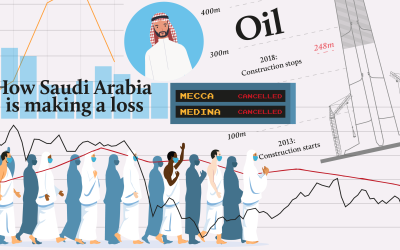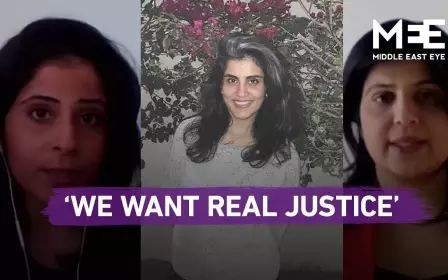Saudi Arabia issues ultimatum to foreign companies to move regional HQs to kingdom
Saudi Arabia is to stop signing contracts with companies whose regional headquarters are based outside of the kingdom, the official Saudi Press Agency (SPA) reported on Monday.
Citing an unnamed source, the SPA said the bold new policy would come into effect in the region’s largest economy from 2024.
"Saudi Arabia intends to cease contracting with companies and commercial institutions with regional headquarters not located in the kingdom,” it said.
"The cessation will include agencies, institutions and funds owned by the government and will take effect on 1 January 2024.
“The decision aims to create more jobs, limit economic leakage, increase spending efficiency and guarantee that the main goods and services purchased by the different government agencies are made in the kingdom," it added.
New MEE newsletter: Jerusalem Dispatch
Sign up to get the latest insights and analysis on Israel-Palestine, alongside Turkey Unpacked and other MEE newsletters
Companies based abroad will still be able to deal with the private sector unhindered, the source told the SPA, and foreign investors will continue to be able to enter the Saudi market.
The move appears likely to cause tensions with Saudi Arabia’s Gulf neighbours - including its Emirati allies - all of whom jostle for foreign investment.
Multinationals often prefer to base regional headquarters in the UAE and elsewhere in the Gulf, where alcohol is allowed and everyday life is comparatively liberal.
Monday’s ultimatum to foreign companies appears to be the latest attempt to reinvigorate the Vision 2030 economic plan, a strategy to diversify the economy and wean the kingdom off its reliance on oil.
In January, Crown Prince Mohammed bin Salman, Saudi Arabia’s de facto ruler, announced plans for a zero-carbon city built in a 170km straight line.
The launch of the project, described as a “cornerstone” of Vision 2030 that will create hundreds of thousands of jobs, was followed weeks after by pledges from the kingdom to invest $40 billion annually in the domestic economy over the next five years, in a bid to kickstart an ailing economy.
Saudi Arabia has been hampered by low oil prices and high unemployment caused by the Covid-19 pandemic, and last year adopted unpopular austerity measures.
Foreign investors
The Saudis are also looking for solutions from abroad.
Outside investment is seen as a key objective of Vision 2030, but plenty of companies already work closely with the kingdom.
Google announced a plan in late 2020 to establish a new Google Cloud region in Saudi Arabia, in partnership with the Saudi Aramco Development Company, a subsidiary of the oil giant. Rights groups have raised concerns about what this means for data protection and user privacy.
This January, Wall Street executives were criticised for attending Saudi Arabia’s Future Investment Initiative, an event dubbed "Davos in the Desert" that many organisations boycotted after the killing of former Washington Post and Middle East Eye columnist Jamal Khashoggi.
According to the SPA, 24 international companies pledged to relocate regional headquarters to Riyadh after this year’s event.
Sunjeev Bery, the executive director of Freedom Forward, a group working to end US alliances with non-democracies, told Middle East Eye in January: “Businesses that partner with Saudi Arabia's dictatorship are enabling a brutal government that uses its power to smash the democratic aspirations of people both inside and outside of Saudi Arabia's borders.”
Middle East Eye delivers independent and unrivalled coverage and analysis of the Middle East, North Africa and beyond. To learn more about republishing this content and the associated fees, please fill out this form. More about MEE can be found here.





